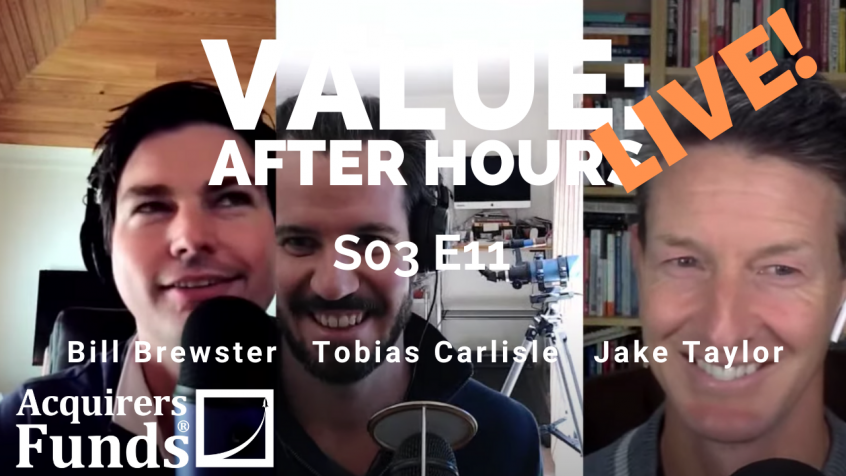In their recent episode of the VALUE: After Hours Podcast, Taylor, Brewster, and Carlisle discussed Testosterone In Investing. Here’s an excerpt from the episode:
Jake: This week, we’re going to be talking about testosterone in investing.
Bill: This is good on the back of talking about punting. It’s a good segue.
Jake: Right. That’s why I waited until it was a perfect timing.
Tobias: Dopamine.
Jake: And dopamine. Some of this comes from this book called The WEIRDest People in the World by Joseph Henrich. Pretty interesting book in that– By the way, WEIRD in this context is actually an acronym for western, educated, industrialized, rich, democratic. What’s cool about this book is that it points out this blind spot I think a lot of us have if you’ve read much psychology research in that a lot of that research is conducted on university campuses in western world. There are some things about that may not be a very representative of most of humanity, especially if you look through a lot of time periods. We’re might be weird group to examine, and then therefore, to extrapolate that out into all of humanity, it might be a mistake.
Tobias: Interesting.
Jake: In this specific context, talking about testosterone, we’re going to start with birds and then shift to humanity. Testosterone is related to mating and courtship in birds and humans, but what it does is the male birds will ramp up their testosterone before mating season and they’ll become much more territorial. They’ll fight with other male birds, they will do these courtship dances and things like that, and it’s all testosterone fueled. What’s interesting is to use birds as our analog is that they have many bird species form pair bonds during mating season, just like humans, in a monogamous way. A lot of the male birds will help with nest preparation and feeding the baby birds once they’re born. They make a paternal investment. Studying sparrows, the male’s will ramp up their T’s, their testosterone levels during mating season, and then it will drop after mating season. When they look at other birds, specifically the red-winged blackbird, which is a polygynous species, the males look for as many females as they can in that situation. They will, after mating– they keep looking and competing for more mates, and their testosterone levels don’t drop.
What’s interesting then is if we bring that to humans, it’s actually the same. In our weird world that’s monogamous societies, after you get married, your testosterone levels will drop and then after you have kids, your testosterone levels will drop.
Tobias: Keep the kids safe.
Jake: Well, it is. It’s a parental investment. Interestingly enough, if you get divorced, the testosterone levels ramp back up. But in polygynous human societies, the male’s testosterone level doesn’t drop. There’s a competition to it. They looked at inhabitants of the Lamu Island of Kenya, where about a quarter of the males will take a second wife, and their T levels stay elevated. The book goes into some really interesting things that I don’t want to get into, but actually the church and its use of monogamy, precepts, was sort of a control device to keep men a little bit more docile, potentially. Anyway, Bill, you look like you had something witty to say.
Bill: I did, and then I thought better of it. I’m just going to keep it in.
[laughter]Jake: Testosterone is typically thought of as making you more aggressive, but that’s not quite right. What actually it does is it makes you increase your want to climb the social ladder and outcompete. That can show up as– it feels competitive motivation, which can show up as aggression, but not necessarily. It also suppresses fear, heightened sensitivity to rewards, engender zero-sum thinking, and makes you less trustful. It’s hypothesized that testosterone suppresses the connection between your prefrontal cortex and your amygdala. So, your rational part of your brain and then the fear part of your brain and breaking connection of those two interacting, changes some behaviors.
What else is interesting with respect to that is that suppressing testosterone within a monogamous marriage, the way that it does, actually promotes greater self-regulation and self- discipline, which is interesting.
Now, there was a study that was done on, to get this back to finance that– they looked at 3000 hedge funds– and apparently you can correlate the wideness of the face of a male with the amount of testosterone. The wider the face, the greater the testosterone. They did these measurements of 3000 hedge fund managers, and then looked at alpha and how did they do. It turns out that the higher the testosterone, the more frequently that hedge fund traded, the more they preferred lottery-like stock outcomes, and the more reluctant they were to sell losers. So, you had all this kind of risk-seeking behavior with the higher testosterone levels. Also, they found in another 2015 study, that when they administered testosterone gel, it actually increased the optimism about future prices that they would expect in these simulated markets. Interesting enough that cortisol also has similar deleterious effects where for alpha– and it’s mostly probably like stress related, like cortisol is the stress hormone. If you’re really stressed out, you make suboptimal decisions.
One of the thing about testosterone I was thinking about, China in their one-child policy, in 2009, they had roughly 30 million surplus men– because the Chinese wanted boys more than girls, they’d abort female fetuses, they’d send them out for adoption. It was about– they wanted to have males to keep the line going. They ended up with a lot more males in this this time period where they were running the one-child policy. What’s interesting is that, it was imposed in different provinces at different times, so they could see then that there was a wave of more males in this area versus another area within China, and so they could do studies to see– and crime rates went up in those areas at the same rate as the imposition of the– 20 years after where it was imposed the one child policy, crime rates went up in that particular province.
It’s interesting how society has harnessed our endocrine systems in a lot of ways through different mechanisms. Anyway, I’m not sure all of the takeaways for being an investor, but maybe– I don’t know, if you’re looking for someone else to manage your money, you might actually not want the most strappingly looking male, alpha male, that is probably going to lead to suboptimal results, potentially, I don’t know.
You can find out more about the VALUE: After Hours Podcast here – VALUE: After Hours Podcast. You can also listen to the podcast on your favorite podcast platforms here:
For all the latest news and podcasts, join our free newsletter here.
Don’t forget to check out our FREE Large Cap 1000 – Stock Screener, here at The Acquirer’s Multiple:




